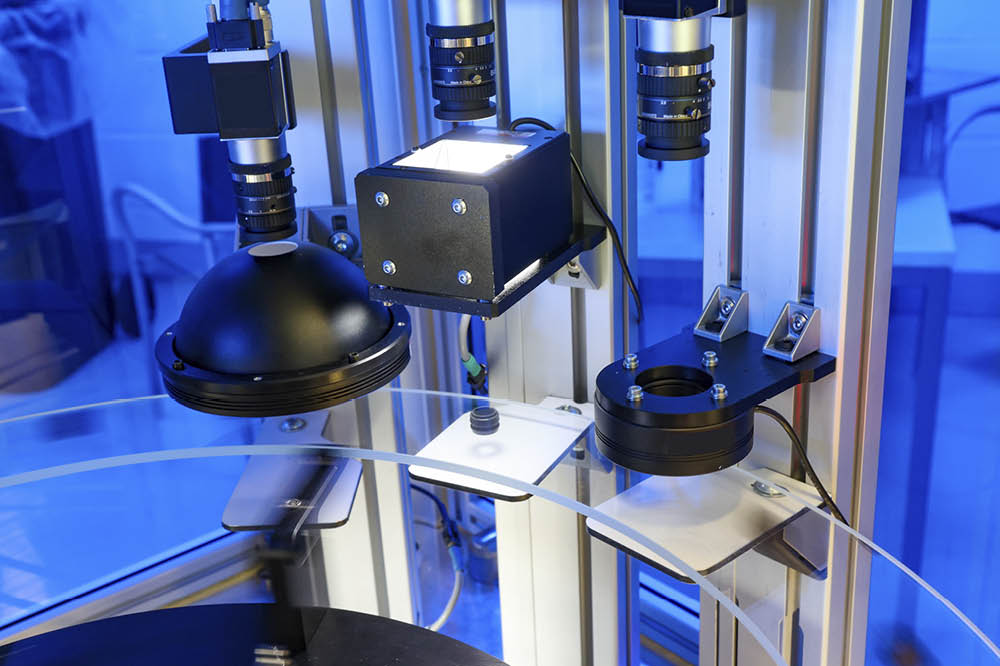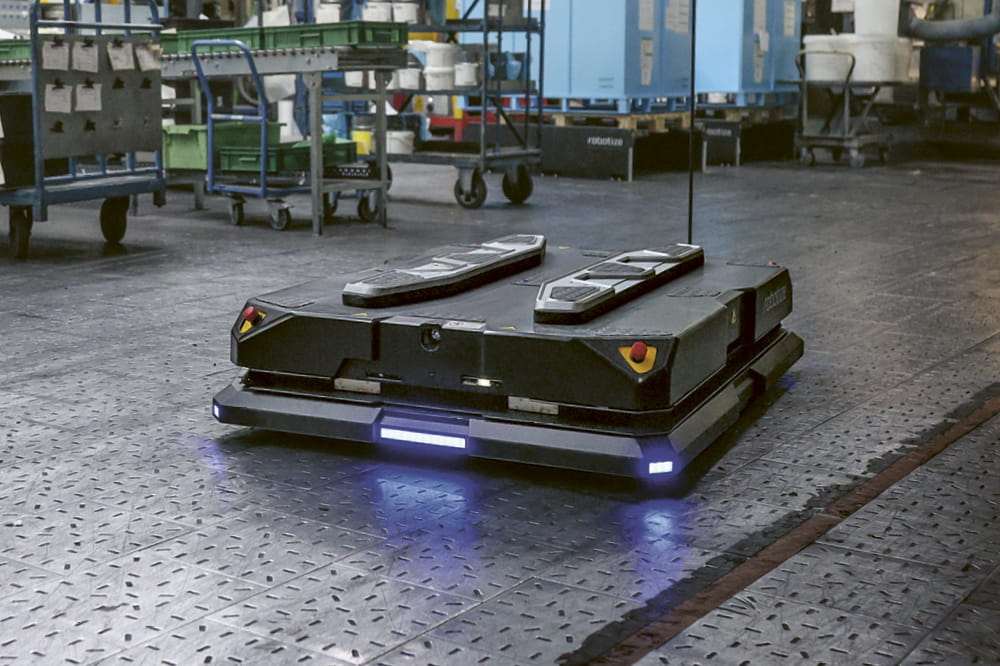Obtain news and background information about sealing technology, get in touch with innovative products – subscribe to the free e-mail newsletter.

“We benefit from working with AI”
Is artificial intelligence changing companies’ everyday life? In an interview, Dr. Matthias Sckuhr, Chief Operating Officer (COO) and Chief Technology Officer (CTO) of Freudenberg Sealing Technologies, talks about data, risks, and optimism. He also explains how AI can support quality control and material development in the future.
Dr. Sckuhr, how do you define artificial intelligence?
Dr. Sckuhr: The exciting question is what is intelligence? It was recently described by someone as the capacity to handle tasks whose solutions are not obvious. I liked that a lot. In turn, artificial intelligence formulates large volumes of data and then makes a decision or prediction based on learned patterns. But that’s only a technical definition. What I consider crucial is the fact that AI helps us handle tasks more effectively, and quickly. A Large Language Model (LLM) such as ChatGPT was certainly a revelation for many people.
Dr. Matthias Sckuhr
As Chief Operating Officer (COO) and Chief Technology Officer (CTO), Dr. Matthias Sckuhr is responsible for Operations; Lean; Supply Chain Management; Purchasing; Quality Management; and Health, Safety and Environment (HSE). He also oversees Innovation Management; Process Technology; and Product and Material Development.
Because an LLM of this kind can do more than just generate texts?
Dr. Sckuhr: It can take over tasks for us, such as those of a programmer. Consider the programming of the control elements in our machines. They always have something that needs to be reprogrammed. We gave an LLM a user manual as a test, and in half an hour it was capable of writing programming code. People have to spend time learning this skill and being trained. This shows that AI offers extraordinary options: We will be able to use the results of AI to make the finishing touches, perhaps changing a few lines of programming to get the results we want.
What is important when using AI?
Dr. Sckuhr: When the decisions are made, there must always be a human to critically assess the outcome. Our company has to make sure that the specifications have been sufficiently defined if we have code co-developed by software. We have all had experiences with AI prompts that are formulated in different ways but are seeking the same information. They lead to different results. The use of AI does not eliminate the need to watch out for risks. How do we guarantee that the system has not violated trademark or intellectual property rights? How do we guarantee that AI is always fed the right data? How do we ensure that our data remains in our company? These are all important questions.
But you are convinced that there will be answers?
Dr. Sckuhr: I am convinced that we have to recognize the opportunities and take advantage of them because there is a growing shortage of qualified personnel. There will be tasks that AI can handle better than us. But we shouldn’t be worried. We would, otherwise, merely march in place. There have been anxieties and misgivings every time a technical innovation comes along, including the advent of robots and the invention of the automobile.
How will AI change the work of Freudenberg Sealing Technologies?
Dr. Sckuhr: First off, we are focusing on how AI can improve work, not on how we can replace people. With AI, we will be able to increase the amount of automation, speed up processes and become more efficient in both administration and production. Take our Failure Mode and Effects Analysis (FMEA) document. It requires continual updating. It enables us to minimize risks and improve our quality. AI could help us with that. I also see considerable potential in reassessing and reevaluating old test data with AI. That is a treasure trove that we can leverage. Risk management can also benefit from AI. So can quality control. We can optimize sales and supply chains. We can forecast demand more precisely, to cite just some aspects of the technology.
So processes will improve?
Dr. Sckuhr: Yes. Our machines are already storing a great deal of data that we aren’t using yet. Process chains are really connected and even today, AI can propose improvements in sub-sectors. The sustainability piece is exciting: When we use our machines more efficiently and with fewer interruptions, less CO2 is released. And if we set our parameters correctly from the outset thanks to AI, we produce less scrap, since one-third is generated when machines are started up or adjusted.
They expect us to be efficient and fast. They want us to be good. AI helps with all of this.
Will AI support materials research in the future?
Dr. Sckuhr: Yes. We have been working on that for quite a while and have already been successful with polyurethanes. In the future, we will try even harder to take advantage of the structured data in our elastomer database by using AI. The goal is to find new ideas for recipes and processes. Materials are always a compromise among various factors such as longevity, tensile strength, compression and other physical characteristics of polymers. Good chemists need a great deal of expertise and fundamental knowledge, plus long experience. AI will help to accelerate statistically valid tests and identify connections.
Do you see the risk of new ideas emerging at the end for which we can no longer understand the connections?
Dr. Sckuhr: No, our chemists’ knowledge will not be lost. You don’t have to make AI learn new physical connections. Everything that chemists and engineers know, can be shared with AI. In this way, we benefit from the interplay of AI and physical knowledge. In the end, you get data-based proposals that can then be examined and understood.
How did Freudenberg Sealing Technologies become so successful with optical AI?
Dr. Sckuhr: Because we began to invest in optical inspection systems more than 20 years ago. Vision control is a prerequisite for improving processes. That’s no surprise when you have 6 billion seals being produced annually and rising quality standards. Today it is impressive how you can teach AI to tell the difference between a flawed and a zero-defect part. You once needed thousands of examples to train systems. Less than 100 are now sufficient.
Do customers expect the use of AI?
Dr. Sckuhr: Customers expect us to use innovative technologies to improve their products and services. They expect us to be efficient and fast. They want us to be good. AI helps with all of this.
You addressed the data issue earlier. What does a company have to do to prepare its data for AI?
Dr. Sckuhr: When we talk about AI, we actually mean Advanced Data Analytics in many cases. AI interprets data. That’s why every company has to consider how it gathers and stores data, how it integrates the information into the environment, how data quality is ensured, and how access to the data is regulated, and so on. The IT infrastructure has to be scalable. You basically have to think of AI as the tip of an iceberg – and the great vastness beneath it is extremely important, meaning the safeguarding, storage, integration, structuring, transforming and extraction of the data. Without all that, we won’t get anywhere with AI.
There will be tasks that AI can handle better than us. But we shouldn‘t be worried. We would, otherwise, merely march in place.
What role will AI play in the automation of the factories of Freudenberg Sealing Technologies?
Dr. Sckuhr: With the automation of our processes, we are achieving a more efficient utilization of our equipment and even better quality. When machines run continually, we need fewer of them overall and can harmonize our energy consumption. We become more sustainable.
Is AI over- or underestimated?
Dr. Sckuhr: You can overestimate the technology if you have unrealistic expectations for its capabilities. But you can also underestimate it if you fail to consider the time factor. When I think about how quickly ChatGPT caught on, compared to Google establishing itself, that is an incredible acceleration curve we are on.
Could AI take over your job?
Dr. Sckuhr: I don’t think enough of my job is routine for that to happen. But AI can definitely help me analyze data or structure a way of looking at problems.
This article originally appeared in ESSENTIAL, Freudenberg Sealing Technologies’ corporate magazine that covers trends, industries and new ideas. To read more stories like this, click here.
More Stories About Digitalization














